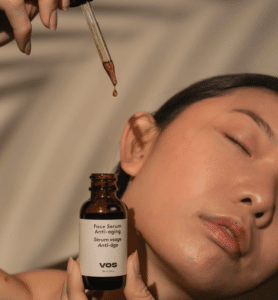Dry skin is more than just an uncomfortable skin concern it often leads to tightness, flakiness, and a dull appearance. While moisturizers provide surface hydration, serums are designed to penetrate deeper and target dehydration at the root. Using the right hydrating face serums to nourish your dry skin can make a noticeable difference in restoring softness, elasticity, and long-lasting moisture.
This guide explores why serums are essential for dry skin, what ingredients deliver the best results, and how to choose and use them effectively for daily care.
Why Serums Are Important for Dry Skin
Deeper Hydration Compared to Moisturizers
Moisturizers form a protective barrier on the skin’s surface, locking in hydration. Serums, however, are lightweight and formulated with concentrated active ingredients that penetrate deeper. For dry skin, this means hydration reaches the lower layers, improving skin health from within.
Targeted Skin Concerns
Dry skin often comes with additional issues like redness, irritation, or premature fine lines. A serum can be selected to address multiple concerns hydration, soothing, and anti-aging without weighing the skin down.
Improved Absorption
Because of their thin consistency, serums absorb quickly. This allows other skincare products, such as moisturizers or sunscreens, to layer effectively without feeling greasy.
Key Ingredients in Hydrating Face Serums
When looking for hydrating face serums to nourish your dry skin, the ingredient list is just as important as the brand name. The following are some of the most effective ingredients for boosting hydration:
Hyaluronic Acid
- Holds up to 1,000 times its weight in water.
- Provides instant plumping and long-lasting hydration.
- Suitable for all skin types, including sensitive skin.
Glycerin
- A natural humectant that attracts water to the skin.
- Helps reduce rough patches and keeps skin smooth.
Niacinamide (Vitamin B3)
- Strengthens the skin barrier, reducing moisture loss.
- Calms redness often associated with dry, irritated skin.
Ceramides
- Restore the skin’s natural protective barrier.
- Essential for preventing dryness from recurring.
Aloe Vera Extract
- Provides soothing hydration.
- Reduces discomfort caused by tightness and flakiness.
Peptides
- Support collagen production.
- Help maintain firmness while keeping the skin supple.

How to Use Hydrating Face Serums Effectively
Step 1: Cleanse Gently
Always start with a mild, hydrating cleanser that doesn’t strip natural oils. Dry skin benefits from non-foaming or cream-based cleansers.
Step 2: Apply on Damp Skin
Serums absorb better when applied to slightly damp skin. This also boosts the effectiveness of humectants like hyaluronic acid.
Step 3: Use a Moisturizer on Top
A serum hydrates deeply, but a moisturizer is necessary to seal in the hydration and prevent water loss.
Step 4: Consistency Matters
Hydration builds up over time. For visible results, use a hydrating serum both morning and night.
Step 5: Pair with Sunscreen
Dry skin can be sensitive to sun exposure. Always complete your routine with SPF during the day.
Best Types of Hydrating Face Serums for Dry Skin
Not all serums are created the same. Depending on your specific concerns, one may work better than another.
- Hyaluronic Acid Serums
Ideal for severe dryness, these serums deliver an instant plumping effect and long-lasting moisture.
- Niacinamide-Based Serums
Perfect for dry skin with redness or uneven tone. Niacinamide strengthens the skin barrier and reduces irritation.
- Ceramide-Enriched Serums
Best for extremely dry and compromised skin. Ceramides repair the skin barrier and keep moisture locked in.
- Botanical Serums with Aloe or Chamomile
Great for soothing sensitive, dry skin. These provide both hydration and calming effects.
- Multi-Ingredient Serums
Many modern formulations combine hyaluronic acid, peptides, and antioxidants for an all-in-one solution to dryness and early aging signs.
Building a Skincare Routine with Hydrating Serums
A serum should fit seamlessly into your skincare routine. Here’s a suggested daily routine:
Morning Routine
- Gentle hydrating cleanser
- Hydrating face serum with hyaluronic acid
- Lightweight moisturizer with ceramides
- Broad-spectrum sunscreen
Night Routine
- Gentle cleanser
- Hydrating serum with niacinamide or peptides
- Rich cream or overnight mask to seal in moisture
Benefits of Using Hydrating Serums for Dry Skin
- Restores softness and smooth texture.
- Reduces flakiness and tightness.
- Improves the absorption of moisturizers.
- Supports skin barrier repair.
- Provides a radiant, healthy-looking glow.
Choosing the Right Serum for Your Skin
When selecting hydrating face serums to nourish your dry skin, consider:
- Skin Sensitivity – Look for fragrance-free and alcohol-free formulas.
- Climate and Season – In winter, opt for richer serums with ceramides; in summer, lighter formulas with hyaluronic acid may work better.
- Budget – Effective serums are available across all price ranges. Focus on ingredients rather than brand hype.
Expert Tips for Long-Lasting Hydration
- Drink enough water daily to support skin hydration internally.
- Avoid harsh cleansers and long hot showers that strip natural oils.
- Use a humidifier during dry seasons.
- Apply serums within 60 seconds after cleansing for maximum absorption.
Conclusion
Dry skin requires more than a standard moisturizer to stay balanced and healthy. Incorporating the right hydrating face serums to nourish your dry skin provides deeper hydration, strengthens the skin barrier, and restores a radiant complexion. By choosing formulas rich in hyaluronic acid, glycerin, ceramides, and niacinamide, and applying them consistently, you can transform dryness into comfort and resilience.









